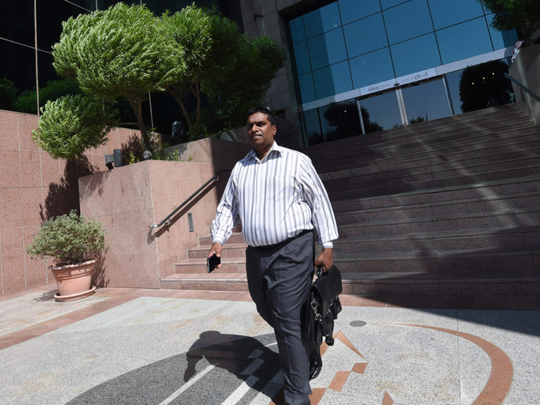
Riyadh: In Saudi Arabia where many people spend a big chunk of their lives online, like elsewhere in today’s world, John Gunti seems like a relic from a bygone era.
The Indian national knocks on doors in the business district of the Saudi capital Riyadh, hoping to sell a 22-volume World Book Encyclopedia that weighs about 25 kilograms (55 pounds).
Even though times are tough in an oil-dependent economy where everyone is cutting back, Gunti says: “Cold calling is my passion.”
But what would anybody want with such a tome these days, when every question can be answered on a smartphone?
As a direct marketer, rather than just a static display in a bookshop, he is always ready to explain.
“You’ll ask me 100 questions. I’ll answer your 100 questions,” says Gunti, 47, who carries fold-out promotional material in a smart black satchel to help his pitch.
After 11 years in the business, and prior experience in medical diagnostic sales back home, Gunti says it doesn’t matter what product is being sold.
“If you want to sell a stone, you can sell it. If you want to sell sand, you can sell it. What matters is attitude: I have to sell this product,” he says.
Still, Gunti believes books have their place, even though sales have slumped to almost nothing.
Gone are the days when his company, Pioneer House, had about 20 salesmen, all of them from South Asia, who even came to blows over customers. Not the fast-talking Gunti, though. He says he never relied on fists but only on his power of persuasion. Gunti once had three or four salesmen under him and got a share of their income as well as his own.
“I worked on commission all these years,” he said.
The more prosperous era ended about two years ago.
“It was good some time ago but now... the demand has gone down,” leaving only Gunti and one other Pioneer House salesman hunting for customers.
According to him, theirs is the last surviving Riyadh firm in this business. Gunti depends on the roughly 25-percent share he earns on each 2,000 riyal ($533) World Book Encyclopedia set he sells. He also offers the more costly Encyclopedia Britannica, children’s encyclopedias and multimedia educational programmes from which he also gets a cut.
“There were times where I sold five encyclopedias or six encyclopedias a month,” says the well-spoken Gunti, glasses perched atop his head. “The ideal ratio is that if you make five presentations, you need to close one deal.”
Now it takes 100 meetings to make a sale, so “you need to make more effort to meet more people,” he says. “Ninety-nine percent are ‘nos’.”
Some of his business comes from referrals but most of his time is spent on cold calls. He rides elevators up and down the towers of Olaya Street and King Fahad Road in Riyadh’s business district, ringing doorbells. Experience tells him who to target.
“If I go to an office I don’t just approach every person there.”
Gunti, who speaks some Arabic but makes his pitch in English, says he has the best luck with Jordanians, Syrians, Egyptians and Palestinians from among the millions of expatriate workers in the kingdom. Saudis and other Arabs are less likely buyers.
“I’ll approach and I’ll introduce myself in a friendly way so that he gets friendly with me,” Gunti says. “Then I start my pep talk and get his background about his children and their ages and everything. Then in my mind I decide what (product) to present to him, so accordingly I’ll make a presentation. Then I’ll close the deal.”
That is the tricky part - getting a stranger to part with 2,000 riyals.
“It all depends on how you make your presentation,” says Gunti. “He buys because of John, not because of the product, not because of the company. Because of trust in John.”
Every customer asks why he should buy the printed encyclopedia, to which Gunti answers: “A book is more comfortable” than online and “has its place”.
The salesman says he enjoys a job where he can help children learn, and he still believes “there is a big market”.
But the kingdom’s economic slowdown has left him barely getting by.
“It’s (a) tough time for me,” Gunti admits, his business shirt showing signs of wear. “I’m unable to send any money back home” to his wife and two grown daughters in Hyderabad. “This month I may earn only 2,000 riyals. Or even there were times I earned only 1,500 riyals.”
He doesn’t know how much longer he can keep going.
“I’m really planning to quit,” he says. “I have plenty of talents - people skills and presentation ability - that could be useful elsewhere.”
But Gunti firmly believes that, far from dying out, door-to-door sales is something that will survive economic downturns.
“Door-to-door is a system,” he says. “Direct marketing will never die.”








